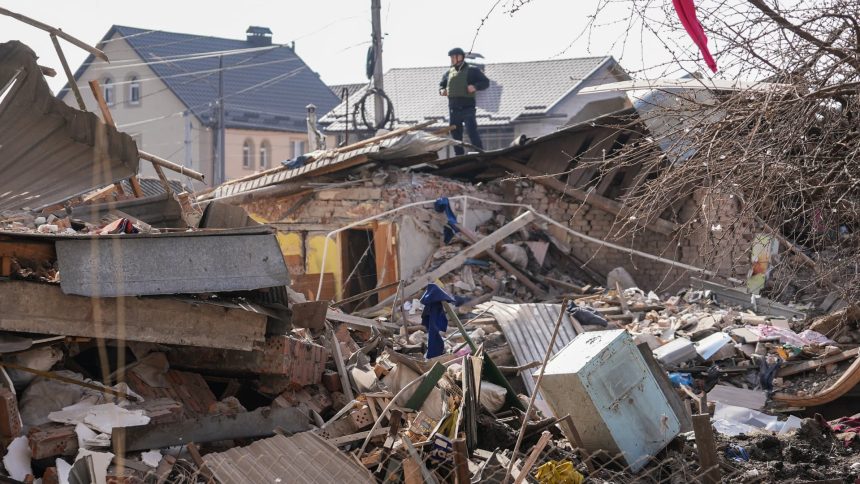German political parties targeted by Russian hackers, Google cyber unit says
Russian hackers last month targeted German political parties with a phishing campaign, Google’s cyber unit Mandiant said in an alert released on their website.
“Phishing emails were sent to victims purporting to be an invite to a dinner reception on 01 March bearing a logo from the Christian Democratic Union (CDU), a major political party in Germany,” the alert said.
Mandiant said the Russian group behind the attack was identified as APT29, which has been linked to Russia’s Foreign Intelligence Services.
“This is the first time we have seen this APT29 cluster target political parties, indicating a possible area of emerging operational focus beyond the typical targeting of diplomatic missions,” the alert read.
“We judge this activity to present a broad threat to European and other Western political parties from across the political spectrum.”
Germany’s Federal Office for Information Security did not immediately respond to CNBC’s request for comment.
— Sophie Kiderlin
Pictures show destruction after fresh round of Russian missile strikes hit Ukraine
Pictures show destruction in cities across Ukraine after the latest round of Russian missile strikes on the country. The attacks damaged electricity and other infrastructure as well as residential buildings in Ukraine on Friday.
“Russia is at war with people’s everyday lives,” Ukrainian President Volodymyr Zelenskyy said in a post on social media platform X on Friday.
EU leaders respond to Russia’s comments on Western involvement in the war
European Union leaders on Friday responded to comments from Russia saying it considered itself to be at war due to the Western intervention in Ukraine.
EU Commission President Ursula von der Leyen, meanwhile, said that Russia’s comments show that the Kremlin has betrayed Russians by not admitting to the war and spreading disinformation, Reuters reported.
Separately, French President Emmanuel Macron said it would be wrong to believe Russian aggression would end in regions such as Donbass and Crimea, which are either partially or fully occupied by Russia. The comments also raised uncertainty about Russia’s military goals, he added according to Reuters.
European Union Council President Charles Michel said that Russia’s comments proved the importance of expanding Europe’s defense sector.
“We must tell to our citizens all across the EU that if we want peace, if we want security and stability, it is extremely important to improve our defense capabilities and to build a true European Union in defense,” he said according to Reuters.
Michel also said that the EU was “not intimidated” by Russia saying it would retaliate if the EU used the profits from frozen Russian assets to support Ukraine.
Russia building up 100,000 troops for possible summer offensive, Ukraine commander says
Russia is building up a group of over 100,000 troops who could be deployed for a possible new offensive in Ukraine this summer, the commander of Ukraine’s ground forces said Friday according to Interfax.
Lieutenant-General Oleksandr Pavliuk said it was not certain what the new troops would be used for, noting that they could also be amassed to replenish depleted units, as Russia’s military faces heavy losses two years into its offensive.
“We do not fully know Russia’s plans. We only know the data they have, what they are creating. They are building up a group of more than 100,000 troops,” Pavliuk was reported as saying on Ukrainian TV.
“It won’t necessarily be an offensive. Perhaps they will replenish their units that are losing combat effectiveness. But there is a possibility that by the beginning of summer they may have certain forces to carry out offensive operations in one of the axes,” he added.
— Karen Gilchrist
EU moves towards giving profits from frozen assets to Ukraine
European Union leaders on Thursday agreed in principle to use proceeds from frozen Russian assets to support Ukraine.
The proposals, which would include buying arms for Ukraine, could come into effect within a few months, according to leaders meeting at a summit in Brussels.
European Commission President Ursula von der Leyen said that the first 1 billion euros ($1.08 billion) from the scheme could be disbursed as soon as July 1. The Commission estimates that profits on the assets could be worth up to 3 billion euros per year.
The proposals are different from the idea of issuing bonds, put forward by the U.S. and Brussels.
The Kremlin said Thursday, ahead of the announcement, that it would retaliate if such measures were taken.
— Karen Gilchrist
Ukraine could step back on sponsors of war list: reports
Ukraine may step back on its “sponsors of war” blacklist in the coming days, Reuters reported on Friday.
The blacklist campaign could be scrapped as soon as Friday, after facing backlash from countries including China and France, Reuters said, citing sources familiar with the plans. A website providing information on individuals under Western sanctions and the origin of Russian weapons parts could also be scrapped.
CNBC could not independently verify the information. Ukraine’s ministry of foreign affairs did not immediately respond to a request for comment.
The campaign, which has no legal standing, is intended to expose companies seen as propping up the Russian economy, for instance by paying taxes for operating within the country.
It comes as Kyiv seeks to maintain support from global allies more than two years into Russia’s full-fledged invasion.
— Karen Gilchrist
Russian Central Bank holds rates steady at 16%
The Russian Central Bank kept interest rates steady at 16% Friday, marking the second consecutive hold after a series of hikes aimed at dampening high inflation.
The decision, which was in line with analyst expectations, comes as the bank forecasts inflation to fall to 4%-4.5% this year, down from 7.4% in 2023.
— Karen Gilchrist
Russia at war due to Western intervention in Ukraine, Kremlin says
The Kremlin said Friday that Russia is at war because of Western intervention in Ukraine, Reuters cited the Tass news agency as saying.
Spokesperson Dmitry Peskov also said that Moscow needed to “liberate” Donetsk, Kherson, Luhansk and Zaporizhzhia — Ukrainian regions annexed by Russia in 2022.
— Karen Gilchrist
Ukraine’s energy grid receiving assistance from abroad after Russian attack; Zaporizhzhia power line restored
Ukraine’s energy grid began receiving urgent assistance from abroad after a series of Russia air strikes damaged energy facilities, national grid operator Ukrenergo said Friday.
Poland, Romania and Slovakia were providing support after the attacks left more than 1 million people without power, the company said in a post on Telegram.
Ukraine’s occupied Zaporizhzhia nuclear power plant — the largest in Europe — was on the verge of blackout Friday morning after Russia struck a nearby hydroelectric dam.
Russian-controlled management said shortly afterward that the plant’s main power line was up again after a high-voltage line supplying it with electricity was repaired.
— Karen Gilchrist
Ukraine’s Kharkiv hit by power outages after Russian missile strikes
Kharkiv faced several of power outages Friday after Russian missile strikes appeared to target Ukrainian energy infrastructure, according to Mayor Ihor Terekhov.
In a series of posts on Telegram, Terekhov said there were around 15 blasts overnight, which also caused disruption to water supplies and transport systems. He did not report any casualties.
— Karen Gilchrist
IMF approves $880 million loan payment for Ukraine
The International Monetary Fund on Thursday approved a third review of Ukraine’s $15.6 billion loan program, allowing the embattled country to draw budget support of $880 million and bringing total disbursements to $5.4 billion.
The global lender said Ukraine’s economy showed “remarkable resilience” in 2023 but noted that risks remain from Russia’s ongoing onslaught. However, Ukraine mission chief Gavin Gray told reporters the fund still expected the war in Ukraine to wind down by the end of 2024, according to Reuters.
The IMF funding, which is due to arrive in the coming days, follows a tranche on EU funding received Wednesday. It comes as a U.S. funding bill remains held up in Congress.
— Karen Gilchrist
U.S. reportedly urges Ukraine to halt strikes on Russian oil refineries
Washington has reportedly urged Kyiv to cease drone strikes on Russian energy infrastructure, cautioning that the attacks risk driving up global oil prices, sources familiar with the discussions told the FT.
One source said the White House had grown increasingly irritated with brazen Ukrainian drone attacks on Russian refineries, terminals and storage facilities.
The warnings were delivered to Ukraine’s state security service and its military intelligence directorate, according to the reports — both of which have ramped up their drone strikes on Russian targets on land, sea and air.
Despite Western sanctions, Russia remains one of the world’s most important energy exporters, and U.S. officials expressed concerns that such strikes could result in retaliatory attacks on Western energy infrastructure.
— Karen Gilchrist
Hungarian Prime Minister Orban congratulates Putin on reelection, state media reports
Hungary’s Prime Minister Viktor Orban congratulated Russian President Vladimir Putin on his reelection, state news agency MTI reported on Thursday.
According to the agency, Orban wrote in a letter that cooperation between Hungary and Russia was “based on mutual respect, allowing the discussion of important issues even in the current very difficult geopolitical situation.”
— Reuters
Russian production of artillery and weapons surges significantly, defense ministry says
Russia’s production of artillery and weapons has grown substantially, the defense ministry said on Thursday following an inspection of several factories by Russian Defense Minister Sergei Shoigu.
In a Telegram post translated by CNBC via Google Translate, Shoigu was quoted as having said that artillery production has grown by nearly two and a half times since existing factories were expanded and new ones were opened.
The production of components for ammunition has increased close to 22 times, Shoigu further said, while one factory he visited produced five times more artillery and aviation weapons now than they did previously, according to the ministry.
Russian defense spending has soared since the war began, boosting the country’s economy which has fared far better than many observers previously expected. This may however not last, Radoslaw Sikorski, Poland’s minister of foreign affairs, told CNBC Tuesday.
“If you put your economy on a crisis or war footing, your GDP rises because you are producing more shells and tanks and all the things that are going to get destroyed, but you’re also wasting the resources and the wealth of your country, and this has limits,” he said.
— Sophie Kiderlin
Read CNBC’s previous live coverage here:
Read the full article here




